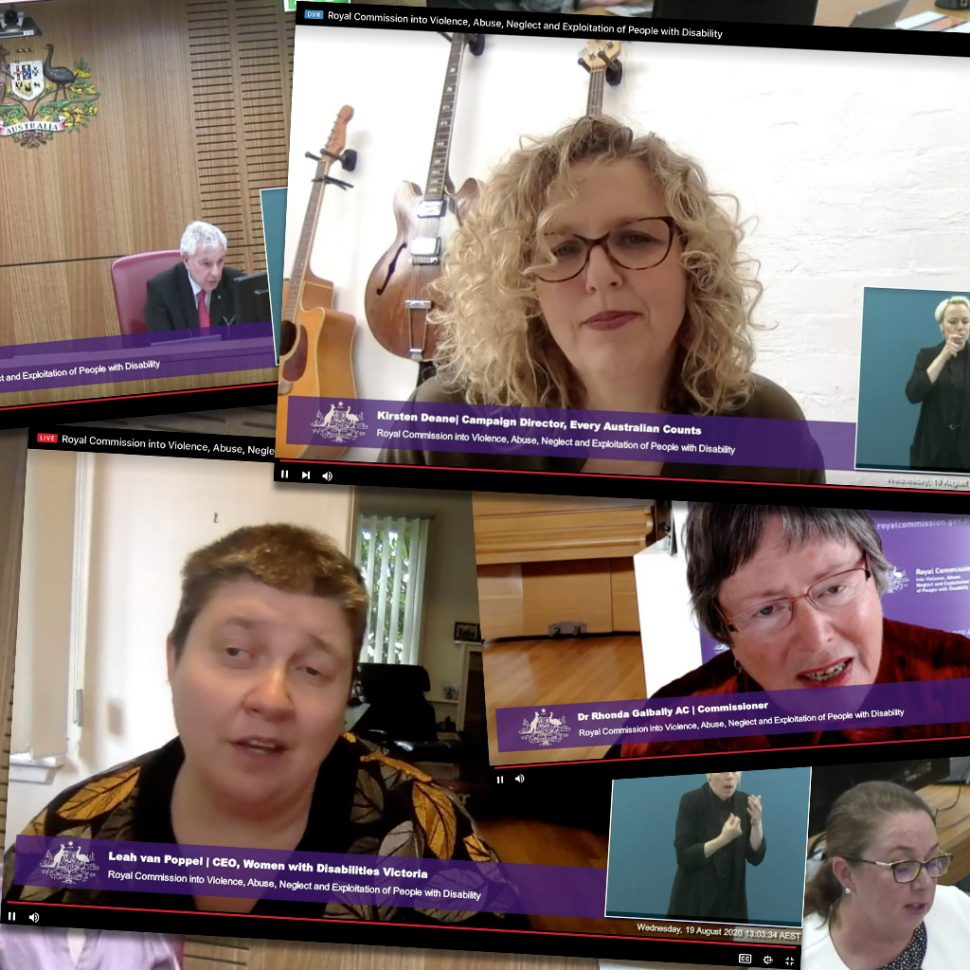Every Australian Counts heads to the Disability Royal Commission

The Royal Commission into the Violence, Abuse, Neglect and Exploitation of People with Disability has been holding hearings this week looking at the experience of people with disability during the COVID19 pandemic.
During the week they have heard evidence from people with disability, family members, advocates and researchers about what the challenges have been – and about how slow the government has been to respond.
The hearings began with a damning opening statement from Senior Counsel Kate Eastman who noted that the government only released a plan for people with disability after more than 70 organisations released an open letter calling on the Federal government to take urgent action.
On Wednesday it was our turn. Along with the CEO of Women with Disabilities Victoria and Chair of the National Disability and Carers Alliance, Leah van Poppel, we had just a brief time to explain the impact of the pandemic and lockdown on people with disability and what else needed to be done to make sure people were not left behind as the crisis continues.
We shared the findings from our recent report “Left out and locked down”. The report summarises the responses of more than 700 people with disability and their families who shared their stories about how they coped during the first wave of the pandemic in April and May.
Ok, next up is @wdvceo and @EveryAustralian – Leah and Kirsten. They are appearing together. #DisabilityRC
— El Gibbs (@bluntshovels) August 19, 2020
So what did we say?
We told the Commission people with disability and their families felt forgotten and ignored. Despite the very real challenges they were facing people felt frustrated at how slow the government was to respond.
People also told us they needed more help. Almost 50 per cent of people with disability lived below the poverty line before the pandemic began. The extra costs they were juggling – important things like gloves and masks to keep themselves safe and well – were costs their budgets could not afford. People talked about going without food.
And finally people told us they needed the NDIS to be more responsive – and much much easier to navigate.
Many people went to great lengths to express their gratitude for their NDIS funding and the difference it had made to their lives. And they told us that some of the changes made by the NDIS at this time had been helpful.
But they also made it clear they were frustrated by confusing and inconsistent information, an inability to use their funds in a way that worked for them and a lack of support and help to navigate the changes the pandemic had made to their lives.
Ms Deane: “Life is a juggle at the best of times … some of these very, very precariously balanced lived were thrown into complete turmoil.”
— PWD Australia (PWDA) (@PWDAustralia) August 19, 2020
The NDIS is pretty complicated and confusing at the best of times. Trying to navigating that maze in the middle of pandemic added yet another burden to people who were already stressed and overwhelmed. And for some it stood in the way of them getting exactly what they needed to stay safe and well.
Given that this pandemic is far from over, we need urgent action to make sure this doesn’t continue.
#DisabiltyRC Ms Deane on key points for @DRC_AU want NDIS to be quicker easier simpler, responsive, every day and in the middle of a pandemic to be responsive to what they need “get out of the way”. More funding for systemic and individual advocacy needed.
— CYDA (@CydaAu) August 19, 2020
In our written statement we made eight recommendations for change:
- Recognition of the additional costs incurred by people with disability during this pandemic and provision of extra financial support
- Clear simple communication from all levels of government and the NDIS
- Additional support from the NDIS
- Greater flexibility in using NDIS funds
- Simpler and easier NDIS processes and much faster responses
- Better training of Local Area Coordinators and NDIA staff
- More funding for individual and systemic advocacy
- More attention to people who are not being heard and whose needs are not being considered in government responses and plans
(You can read more about the recommendations and the full report “Left out and locked down” on our website.)
We have already shared the findings of the report with the NDIA. And now we are writing to every single Federal MP across Australia so they know what they issues are – and what more needs to be done.
And we will keep using the findings to push for the changes you told us you wanted to see.
Feeling forgotten and completely overwhelmed by #COVID19 means people with #disability and families need the #NDIS to communicate easy, clear and consistent info #DisabilityRC
— Every Australian Counts (@EveryAustralian) August 19, 2020
Interested in more?
You can watch the hearings on the Disability Royal Commission website. You can also watch recordings of previous hearings on this site. (They can be a bit hard to find. You need to click on the icon with an arrow in the middle of it on the top right hand corner of the video link.)
There was some media coverage of our evidence:
Disability Royal Commission hears from woman who has been bedridden for 20 years
Australian children with disabilities excluded from online learning during pandemic, inquiry told

Join the conversation